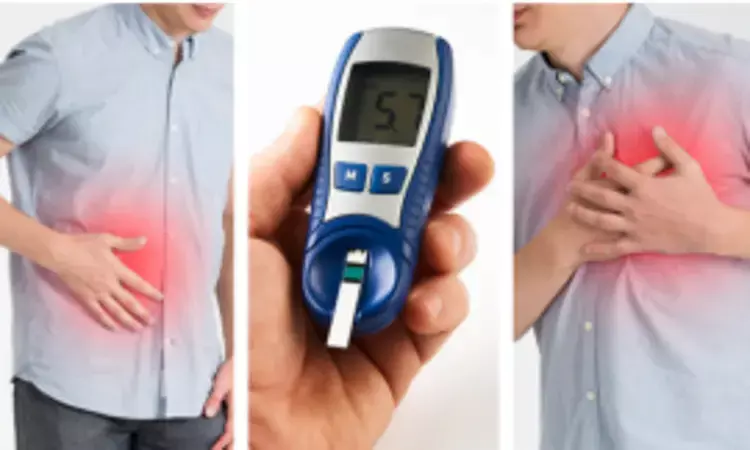- Home
- Medical news & Guidelines
- Anesthesiology
- Cardiology and CTVS
- Critical Care
- Dentistry
- Dermatology
- Diabetes and Endocrinology
- ENT
- Gastroenterology
- Medicine
- Nephrology
- Neurology
- Obstretics-Gynaecology
- Oncology
- Ophthalmology
- Orthopaedics
- Pediatrics-Neonatology
- Psychiatry
- Pulmonology
- Radiology
- Surgery
- Urology
- Laboratory Medicine
- Diet
- Nursing
- Paramedical
- Physiotherapy
- Health news
- Fact Check
- Bone Health Fact Check
- Brain Health Fact Check
- Cancer Related Fact Check
- Child Care Fact Check
- Dental and oral health fact check
- Diabetes and metabolic health fact check
- Diet and Nutrition Fact Check
- Eye and ENT Care Fact Check
- Fitness fact check
- Gut health fact check
- Heart health fact check
- Kidney health fact check
- Medical education fact check
- Men's health fact check
- Respiratory fact check
- Skin and hair care fact check
- Vaccine and Immunization fact check
- Women's health fact check
- AYUSH
- State News
- Andaman and Nicobar Islands
- Andhra Pradesh
- Arunachal Pradesh
- Assam
- Bihar
- Chandigarh
- Chattisgarh
- Dadra and Nagar Haveli
- Daman and Diu
- Delhi
- Goa
- Gujarat
- Haryana
- Himachal Pradesh
- Jammu & Kashmir
- Jharkhand
- Karnataka
- Kerala
- Ladakh
- Lakshadweep
- Madhya Pradesh
- Maharashtra
- Manipur
- Meghalaya
- Mizoram
- Nagaland
- Odisha
- Puducherry
- Punjab
- Rajasthan
- Sikkim
- Tamil Nadu
- Telangana
- Tripura
- Uttar Pradesh
- Uttrakhand
- West Bengal
- Medical Education
- Industry
Severity of liver fibrosis predictor of CVD in type 2 diabetes: Study

Cardiovascular disease (CVD) is the principal cause of death in patients with type 2 diabetes (T2D). In a recent study, researchers have reported the severity of liver fibrosis independently predicted CVD in patients with T2D. The study findings are published in the Journal of Gasteroenterolgy and Hepatology on December 28, 2020.
According to the World Health Organization, cardiovascular disease (CVD) remains the leading cause of death worldwide, accounting for approximately 18 million deaths per year. Nevertheless, the worldwide prevalence of metabolic diseases, such as type 2 diabetes mellitus, obesity, and non-alcoholic fatty liver disease (NAFLD), also known to be common risk factors for CVD, has dramatically increased over the last decades. Compared with nondiabetic subjects, people with type 2 diabetes appear to have an increased risk of developing NAFLD and certainly have a higher risk of developing fibrosis and cirrhosis. Several mechanisms have been suggested to be responsible for associating FLD with CVD through several mechanisms including low-grade systemic inflammation, oxidative stress, adipokines, endoplasmic reticulum stress, lipotoxicity and microbiota dysbiosis which may also be influenced by other factors such as genetic and epigenetic variations. Despite all this evidence, the association of Liver fibrosis and CVD in T2D patients are not fully elucidated and much remains unknown. For this purpose, researchers of the Yonsei University College of Medicine, Seoul, Republic of Korea, conducted a study to assess whether liver fibrosis predicted the risk of CVD in patients with T2D.
It was a retrospective observational study of 1,481 patients who had commenced oral anti‐diabetic drugs to treat newly diagnosed T2D between 2006 and 2010. Researchers used the fibrosis‐4 index (FIB‐4), non‐alcoholic fatty liver disease fibrosis score (NFS), and BARD score to assess the fibrotic burden at the time of T2D diagnosis.
Key findings of the study were:
♦Researchers noted 242 (16.3%) patients developed CVD during the follow‐up period of median 88.1 months.
♦They noticed CVD occurrence was frequently in older patients and was associated with hypertension; metabolic syndrome; obesity; smoking; administration of statin, lower platelet counts; lower alanine aminotransferase, total cholesterol, and HbA1c levels; higher C‐peptide and homeostatic model assessment of insulin resistance levels; higher FIB‐4, NFS, and BARD score.
♦They found FIB‐4 (hazard ratio [HR]=1.163), NFS (HR=1.322), BARD score (HR=1.564), metabolic syndrome (HR=1.556), smoking (HR=2.829), and statin use (HR=0.603) were independent predictor of the risk of CVD.
♦They also noted a cumulative incidence of CVD was significantly different among groups stratified by liver fibrotic burden.
♦Upon competing risk analysis, they found a significant association between the severity of liver fibrosis and CVD development.
The authors concluded, "The severity of liver fibrosis independently predicted CVD in patients with T2D. Thus, assessment of liver fibrosis might allow physicians to optimize the timing of appropriate cardiovascular interventions in such patients".
For further information:
DOI: https://doi.org/10.1111/jgh.15387
Dr Kartikeya Kohli is an Internal Medicine Consultant at Sitaram Bhartia Hospital in Delhi with super speciality training in Nephrology. He has worked with various eminent hospitals like Indraprastha Apollo Hospital, Sir Gangaram Hospital. He holds an MBBS from Kasturba Medical College Manipal, DNB Internal Medicine, Post Graduate Diploma in Clinical Research and Business Development, Fellow DNB Nephrology, MRCP and ECFMG Certification. He has been closely associated with India Medical Association South Delhi Branch and Delhi Medical Association and has been organising continuing medical education programs on their behalf from time to time. Further he has been contributing medical articles for their newsletters as well. He is also associated with electronic media and TV for conduction and presentation of health programs. He has been associated with Medical Dialogues for last 3 years and contributing articles on regular basis.
Dr Kamal Kant Kohli-MBBS, DTCD- a chest specialist with more than 30 years of practice and a flair for writing clinical articles, Dr Kamal Kant Kohli joined Medical Dialogues as a Chief Editor of Medical News. Besides writing articles, as an editor, he proofreads and verifies all the medical content published on Medical Dialogues including those coming from journals, studies,medical conferences,guidelines etc. Email: drkohli@medicaldialogues.in. Contact no. 011-43720751


